Jan 06•9 min read
Are people aware of Digital Privacy?

1. Introduction:
In the digital age, privacy threats related to data and identity are emerging almost every day. From the phones in our pockets to the biometric databases that identify us (to government officials), our personal stake in digital security is growing. Individuals without any private information may still want to be away from aggressive advertisers or snoopers.
We are hit by personal data encroachment that was unimaginable decade ago, and many companies and governments are using these data in a way that does not have people’s best interests. Unfortunately, those we trust to handle our data sometimes fail us. Hence, being aware of the privacy risks and protecting ourselves from those risks is the need of the hour.
Blocksurvey has conducted a study on Digital Privacy Awareness recently. This is our first research study on overall Digital Privacy Awareness and we would like to thank everyone who has answered our survey and contributed to our study.
The survey had a set of 16 mandatory questions that were focused on individuals’ digital life and their potential exposure to digital risk and awareness.
2. Demographics:
The total respondents are 136 with 62.5% being Male and 37.5% being Female. The respondents are from different age groups with 44.1% participation from the people in the age group of 25–35, 28.67% participation from the age group of over 35, 22% participation from the age group of 18–24 and 5.1% participation from under 18 age group.


3. Key Insights into the study:
3.1 Total Internet Usage:
50% of the respondents in total spend about 1–4 hours /day on the Internet other than work. Out of which 63% like to do “General Browsing”, 55% like to do social networking, 49% like to read Blogs&News, 46% like to watch/share videos and so on.

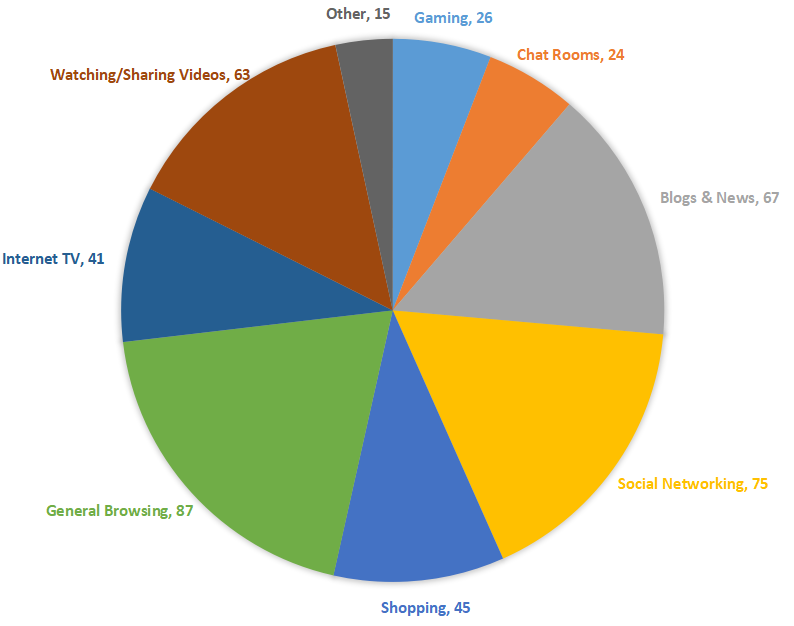
3.1.1 Fifty-two percent of the women, as opposed to 48% of the men, indicated that they usually spend 4 hours per day on the internet.

3.2 Awareness of Digital Privacy Aspects:
When it comes to digital awareness, few aspects such as “Not saving Password in the browser “, “ Avoid the usage of public WiFi”, “Reading the T&C before signing up for any application “, “Being aware of cookie policy and not giving permission to websites to track the cookies “ helps us from protecting our privacy and data online. The survey had 4 different questions to analyze the awareness on the above aspects and below are the insights.
3.2.1 47% of respondents tend to “Save their password “ in the browser sometimes whereas 42% never save their Passwords.

3.2.2 The women were less aware and also more likely to save the password in the browser(49%) than men (45%).

3.2.3 53% of respondents use “Public WiFi sometimes” whereas 44% never prefers to connect to public WiFi.

3.2.4 The women were comparatively more aware with 50.98% of women never using public WiFi as opposed to men.

3.2.5 When it comes to reading T&C before signing up, the awareness is very little as only 9% of respondents always read their T&C and a maximum of 48% of respondents read T&C sometimes and 41% never read their T&C.

3.2.6 The women were comparatively less aware of reading T&C before signing up the application with 45% answering they never read T&C as opposed to men 37.5%.
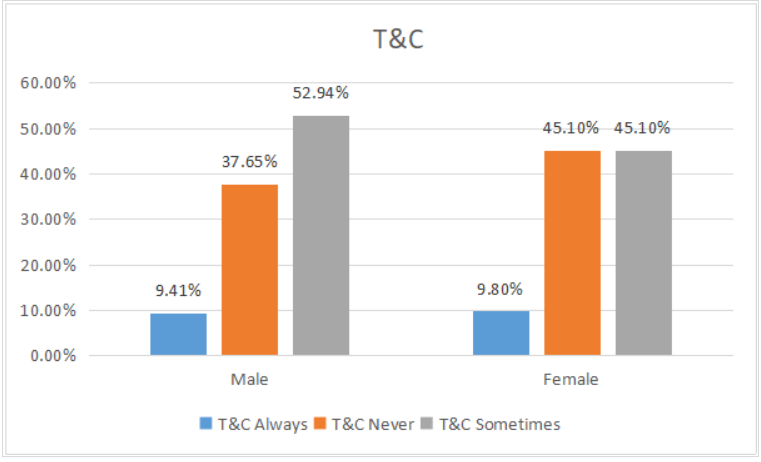
3.2.7 When it comes to awareness of cookie policy, we can see there is a pretty good awareness with 45% of respondents answered “Yes” for the question “Are you aware of the cookie policy “ whereas minimum 26% answered “No”

3.2.8 Men are more aware of cookie policy with 49.41% answered that they are aware as opposed to women (37.25%).
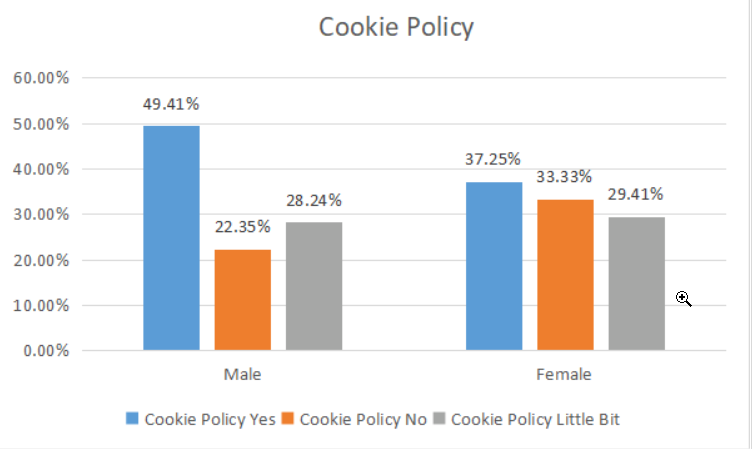
Overall the awareness on cookie policy is high, comparatively awareness on problems in using public WiFi and Saving password in the browser is better, whereas awareness on reading T&C and privacy policy is very little which needs to be improved. When it comes to gender-based awareness, women are comparatively less aware than men.
3.3 Awareness of Privacy-enhancing tools:
In recent years, we have been encountering a lot of privacy breaches across the digital platform. On the other side, so many privacy-enhancing tools are circulating and available for use. In this study, we came up with a few lists of privacy-enhancing tools across multiple categories and conducted a study on the awareness and usage of those tools.
3.3.1 Key Insights:
3.3.1.1 Out of the list of privacy-enhancing tools, it came to light that about 55% of people use 2-factor authentication the most, followed by VPN (37.5%). The other tools such as privacy-enhancing browsers are being used by 33.8% and privacy-enhancing search Engine is being used by 23.5%. Password managers are being used by 30%, whereas 22% tend to use Encrypted emails. The complete list and % of usage is given below.
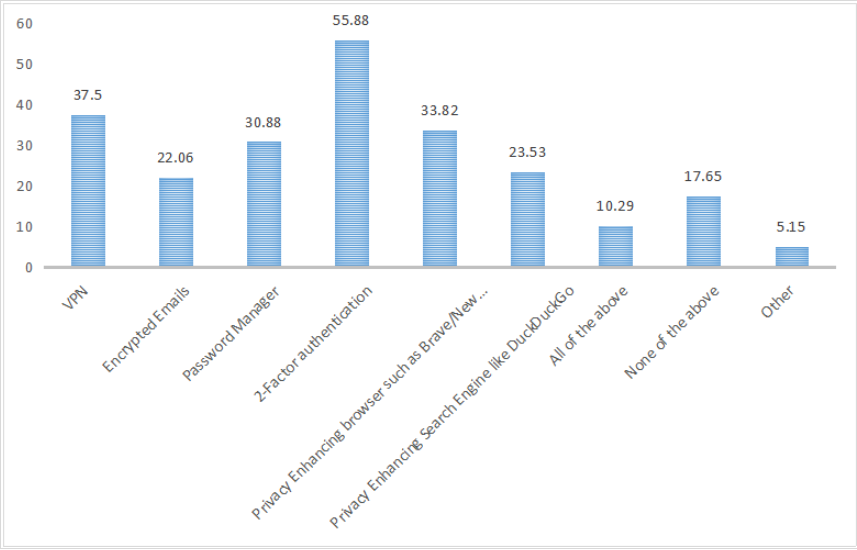
3.3.1.2 Men tend to make greater use of VPNs (43% vs. 37% for women), email encryption programs (28% vs. 19%), password managers (38% vs. 27%), privacy-enhancing browser (44% vs. 21%), privacy-enhancing search engine(47% vs. 15%) and two-factor authentication (72% vs. 39%). This shows the awareness related to the availability of privacy tools is a little less for women compared to men.
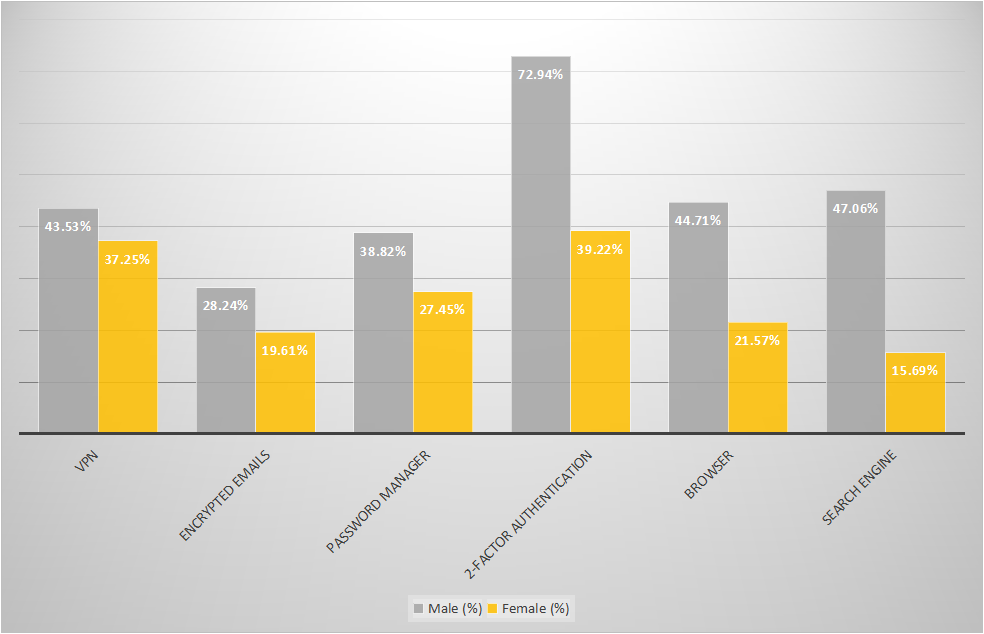
3.4 Overall awareness of Privacy Risks:
In an attempt to find out the awareness of privacy risks in the digital world, we came up with the question “Are you aware of Privacy Risks in the digital world” and we gave 4 different options.
3.4.1 Key Insights:
3.4.1.1 40% of people answered “I am aware but I still like to use Digital world”, whereas 33% answered, “I am very much aware and I don’t want to share any information “. 16% answered “I am aware but I don’t know what to do “ and a very little of 2% answered I don’t know the privacy risks. This shows people are very much aware of the privacy risks in the digital world but they are still finding out options to protect their privacy.

3.4.1.2 Women are less likely aware than men overall related to digital risks.

3.5 Awareness of Digital Privacy Laws:
Individual privacy rights are important facets of almost every country’s legal system. While no two privacy laws or regulations are the same, they all serve the same purpose: to allow individuals to act and speak without fear that things done and said in private will be exploited or exposed. There are many different types of Internet privacy laws, ranging from protections for employee e-mail communications and restrictions on re-broadcasting social networking data to browser tracking activities and online data breaches.
Familiarization with privacy laws is a good idea whether you’re an individual consumer looking to go shopping online, a business collecting personal customer information, or someone who otherwise has anything else to do with the Internet.
3.5.1 Key Insights:
The awareness of digital laws is not that great with 44% answered “I know there are laws but I don’t know the details “whereas a minimum of 28% answered “Yes” for the question “Are you aware of the Digital Privacy Laws?.

3.6. Overall preference between Comfort vs Privacy:
With the advent of so many personal assistant devices available and websites are working towards personalized ads/personalized content, privacy is being lost, whereas on the other side comfort is being increased. The study intended to find out the preference by posting a question “ According to you, which is more important? “ and the options provided are “Comfort/Personalization” and “Privacy”.
3.6.1 Key Insights:
We are glad to see almost 86.7% answered “Privacy” where very little 13% answered Comfort. This clearly shows people definitely give more importance to privacy rather than personalization.

4. Summary:
Listed below are the overall summary of Insights related to the study.
1. People are aware of digital privacy risks and the potential impact due to digital privacy loss.
2. On the other hand, the awareness to prevent the risk or ways to protect digital privacy is still in the nascent stages.
3. When it comes to gender-based awareness, women are comparatively less likely aware than men related to digital privacy risks and available privacy-enhancing tools.
4.1 Call-To-Action:
The digital world is not safe but that doesn’t mean we should stop using it. There are many promising privacy-enhancing solutions available such as “Brave — A secure, fast and private web browser ”, “DuckDuckGo- A safe and secure search engine ” and several decentralization applications built on blockchain platforms. One such effective platform is Blockstack. Blockstack is a decentralized computing platform that puts users in control of their data and identity. Apps built on Blockstack make data breaches and trust violations an antiquated notion.
To find out the list of more such DApps built across blockchain platforms, visit Dapp.com (The Cross-chain Dapp Store where everyone can discover, use, and enjoy apps with ease!) or App.co (The best place to discover Decentralized apps).
Also, many countries spanning across continents have enacted privacy laws that seek to protect the information of internet users. A few of the Digital Privacy laws include CCPA( The California Consumer Privacy Act of 2018 ), GDPR(General Data Protection Regulation), Digital Privacy Act and PIPEDA, Canada, The Act on the Protection of Personal Information (APPI). Privacy regulations are great, but in order to enjoy them, we have to be proactive.
Let’s hope 2020 will be a great year with more increasing privacy awareness and a better privacy-focused Internet will be available with many great products.
5. Conclusion:
Thanks for reading! People like you make this survey great! Thanks for participating in the first research study of Digital Privacy Awareness. Hopefully, you learned something interesting — or maybe found a new privacy tool to try! If you have any questions, reach out to [email protected].
